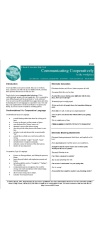Category: FAQ-Communication-Practical Tips
From here you can access many practical communication techniques and skills to help you improve your communication and relationships at home and at work. Tips and suggestions apply to face-to-face one to one communication, written communication, and other media.
What is “self-disclosure”?
Self-disclosure is a simple (at least on the surface) approach to communication that involves sharing information about yourself, history, present, emotions and thoughts. Originated and explained by Sidney Jourard, a Humanistic Psychologist, this simple approach, at least used skillfully, can…
Using Argyris’ Ladder of Inference” for better communication
Better communication – better understanding The ladder of inference is a concept developed by C. Argyris to explain common thinking and communication processes and to help us become more aware of how we interpret the world around us, and improve…
What Are Mirror Questions (Dyadic Communication)
What Are Mirror Questions? Mirror questions – non-directive techniques to encourage others to speak Mirror questions are non-directive in nature, which means they are intended to encourage another person to continue to add detail to what they have said without…
What are probing questions (dyadic interactions)
What Are Probing Questions? Probing Questions Ask More Information or Clarification Probing questions are, in essence, followup questions that ask for additional information, request the person expand on what she has said, or ask the person to go deeper. Using…
What are the advantages and disadvantages of using open ended questions?
Like most communication techniques open ended questions work in some contexts, and are counter-productive in others. Open ended questions are good in situations where both parties want to understand each other, share control of the conversation, listen to each other,…
What is “responsiveness” and why is it so important in communication?
Responsiveness In Management And Leadership Responsiveness may be THE essential leadership skill. Being responsive in communication has a very specific, but obvious meaning once you know what it is, and responsiveness is absolutely critical for creating better relationships, trust, and…





